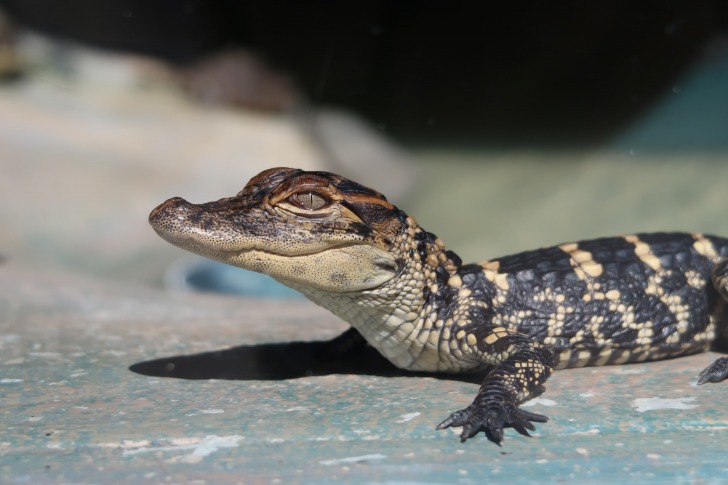Missouri does not have any native alligators.
However, some rumors suggest that pet alligators illegally obtained were released to the wild in MO.
Contents
So… Are There Alligators in Missouri?
Untamed Animals says that native alligator populations found north of Tennessee and Arkansas are rare.
Some incidents of alleged released or escaped pets are true though.
In 2019, an alligator showed up on a sidewalk in South Saint Louis, Missouri, for instance.
A resident directed a broomstick out of curiosity – just to see what the alligator would do.
It caused a bit of a fright, especially since a 6-pound chihuahua was in the possible “eating range” of the three-foot-long Crocodylia creature.
Pet alligators are illegal in Missouri, so that’s part of the shock of seeing one on a St. Louis Dutchman neighborhood street.
Animal Control took it, and new home, the Exotic Amphibian and Reptile Center.
Suspicion grew more intense as news of wildlife rescue intervened.
Fake news circulated across social media, saying that the Missouri Department of Conservation (MDC) was stocking Table Rock Lake with alligators, saying that it’s their original habitat.
MDC denied that they were releasing alligators into the lake in 2020, and as far as I know, they haven’t.
Someone in 2020, which was the same year as the coronavirus pandemic, apparently had nothing better to do during the worldwide quarantines and lockdowns but spread fake news against the MDC.
Anyway, it has been confirmed that alligator sightings are rare in MO, and they’re not native.
The only place you’d see them is in refuge places.
They’re probably confiscated from people who weren’t supposed to have them.

Alligator Species in Missouri
The American Alligator is the only Native alligator species in the United States, and the U.S. also has no crocodiles of its own.
Stories about alligators in MO you have heard are probably a lot like the Loch Ness Monster stories.
They’re a myth or legend in some cases.
Again, the other exception is the presence of illegal pets, which happened in 2010.
According to KLTV, a salesman sold about 50 illegal reptiles door to door in the town of Kennet.
By 2012, the police began to confiscate these little babies, many of which already grew to three feet.
Reinforcing the prohibition of not having alligators as pets relates to how fast they can snap off one of your limbs.
Authorities say that the reason for being concerned about trying to have alligators as pets is the danger they pose to everyone, including children or (legal) pets.
Concerning the 2019 incident, it’s probably fortunate that no one ended up injured – or worse – after the St. Louis city alligator sighting.
Alligators are sometimes calculated but very unpredictable creatures.
Is it Safe to Swim in Missouri?
You won’t have to worry much about alligators in Missouri when swimming, usually.
Just beware of the place where those illegal alligators were sold (the town of Kennett and surrounding areas).
As far as I know, law enforcement rounded them all up.
You can never be too safe though. Watch out.
Places You Can Swim in OK
I usually swim in designated beach areas or pools.
They typically have lifeguards on duty. That’s why.
In MO, you can try the Lake of the Ozarks, Long Branch, Pomme de Terre, or any of the other spots recommended by Missouri State Parks.
There’s also a public swimming pool on the Washington State Park premises.
Swimming Precautions to Take
Alligators are probably not your biggest concern in Missouri.
However, you should think about E. coli, which often shows up in natural water sources more than in disinfected swimming pools.
Beware after heavy rain, for instance.
That’s when bacteria levels climb.
You can enter your current location on the Missouri State Park website to find out about the beach’s status in that area.
If not automatically detected by your device, type in the MO zip code or starting address.
That will show you water quality reports of the swimming areas near you.
Beware of swimming in areas where you find excess blue-green algae.
This sometimes causes irritating skin conditions.
What’s more, stepping onto rocks covered with seaweed could cause slipping hazards, so be careful.
Interesting Alligator Facts in Missouri
I have already told you the story about illegal pets growing up into three-foot-long creatures that the police want to remove from MO streets.
These alligators sometimes react out of fear, however, and they won’t necessarily use you as prey – at least if they’re not hungry.
There’s one other thing I didn’t realize until now, by the way.
See, alligators and crocodiles are not the only ones that belong to the Crocodylia order.
Aside from these two species, there are also the Caimans and Gharials.
None of them come from Missouri, however.
Other Interesting Alligator Facts:
- Alligators can survive if icy water is still liquid. There are places in the U.S., such as Oklahoma, where alligators have contended with colder than usual temperatures. They prefer warm weather, but they can also survive in a freezing lake, river, stream, etc., as long as there’s some liquid in that body of water.
- They hold their breath for record times. Any evidence I found when researching reveals that alligators can hold their breath for longer times than I do. Even 10-15 minutes, 20-30 minutes, or an hour is much longer than 30-60 seconds, which I can hold my breath for. Record times that an alligator held the head underwater range from 1-2 hours, to 8 hours, and to 24 hours.
- Alligators can “sense” their prey. They have specs on them that appear like dots. Those are sensors that they use to detect the presence of animals in the water that they can eat.
- Their skin matches watercolor. Alligators are typically a dark color, such as dark gray or black. However, you may also notice green tints on them. Some have had this from birth, but others may have matched the color of the water they inhabit.
- They can weigh half as much as a car. The maximum weight is about 2,200 pounds for adult males, and that’s about half what the EPA says is the average weight for a car.
Alligators vs. Crocodiles
The Crocodylia order includes 23 large reptiles and amphibians, divided into four species.
Alligators and crocodiles are the two of the four (besides caimans and gharials) you probably hear about most often. However, that may depend on where you live.
Alligators and Crocodiles, neither of which are native to Missouri, have their differences.
1. Facial Features
Alligators have a larger and rounder snout than crocodiles.
Crocodiles have longer and pointier snouts than alligators.
You may have also noticed that a crocodile has a different “smile” than an alligator.
In a resting position, more of a crocodile’s teeth will stick out the sides than an alligator’s.
2. Weight
The average weight of a male alligator only reaches 500-600 pounds as opposed to the crocodile, which reaches an average of 1,000 pounds.
The maximum, however, of an alligator is about 1,000 pounds – still less than the Saltwater Crocodile’s maximum 2,200-pound weight.
3. Length
The Nile Crocodile, the largest in the world, grows to approximately 20 feet long.
Other crocodile species reach about 17 feet maximum.
The alligator comes in a little shorter at average lengths of 10-15 feet.
4. Mouth and Teeth
You won’t see much of an alligator’s teeth when its mouth is closed like you would a crocodile.
That’s because the alligator has somewhat of an underbite (lower jaw shorter than the upper one).
You might see some “fangs” extend out from an alligator’s upper jaw though.
I never knew the difference between a crocodile and an alligator until now.
All I know is, I would picture the toothy smile that sometimes makes me chuckle when I see it in pictures.
It’s the croc’s resting position, but it makes me think they’re smiling and/or laughing like in cartoons.
5. Skin Appearance
Crocodiles usually have tan and olive hues.
Their sensor spots take up more of their body than the alligator, which only has the sensors around its snout.
Alligators may have hues of dark green but often are dark gray, with their underside often a lighter shade.
Alligators have smoother skin than crocodiles, and alligator scales are also smaller.
6. Saltwater vs. Freshwater
Alligators function better in freshwater than in saltwater.
Crocodiles can handle lakes, streams, and rivers closer to larger saltwater bodies, such as bays or oceans.
Both animals seem to live in swampy areas though, probably because they can maintain a lowkey presence in shallow waters there.

3 Safety Tips for Swimming in Alligator-infested Waters
1. Don’t go near alligators.
I think it was smart that a witness called animal control when an alligator let loose in St. Louis in 2019.
One man may have played with fire – or alligator teeth rather – by offering the three-foot-long growing reptile a broomstick.
Fortunately, curiosity didn’t cause any injuries, but I wouldn’t suggest going near alligators at all in the water, on the sidewalk, or anywhere else.
2. Don’t ignore “no swimming” signs.
Adhere to the list of places where the state of Missouri says it’s safe to swim.
Nothing bad may immediately happen to you, but you never know what contaminating pollutants are in the water.
What’s more, you don’t want to get swept away by a tide, like what may occur in the Missouri-Key-Ohio Key Channel.
3. Don’t swim alone.
Not swimming alone especially applies at night or when a lifeguard is not on duty.
However, you should try not to go into the water without anyone knowing where you are.
It’s better to take at least one other person with you.
For the highest safety level, I recommend three or more people with at least one wading near the shore remaining on the lookout.
Summary
If you see alligators in Missouri, you’re probably either dreaming or have spotted an illegal pet on the loose though.
Missouri Safety Overview
READ THE FULL REPORT: Missouri Safety Review
Safety Index:
- OVERALL RISK: MEDIUM
- TRANSPORT & TAXIS RISK: LOW
- PICKPOCKETS RISK: LOW
- NATURAL DISASTERS RISK: MEDIUM
- MUGGING RISK: MEDIUM
- TERRORISM RISK: LOW
- SCAMS RISK: LOW
- WOMEN TRAVELERS RISK: LOW
Frequently Asked Questions
What do alligators usually eat?
They’re definitely not vegetarians, which is why you should stay away from them.
They won’t choose you first, though.
That’s probably good news for you.
As long as they have a deer, turtle, fish, frog, or another animal to munch on, they won’t try to take a bite out of you.
Can an alligator survive in a cold climate?
They don’t do well in cold climates most of the time.
That’s why in areas where the winters are harsh you won’t see them.
If they have to endure a freezing body of water, however, they can adapt to the surrounding temperature because they are cold-blooded reptiles.
It doesn’t mean they won’t eventually die if they can’t figure out how to survive.
They hibernate like other animals, such as bears, during the winter when they have to save themselves.
Are alligators and crocodiles the same thing?
Alligators and crocodiles are the same in that they are both called Crocodylia.
However, their distinct round versus pointy facial features, color, size, and weight set them apart.
Will an alligator eat a whole human?
Alligator attacks against humans for food are not too common.
They’re more likely to hurt you by taking a bite out of one of your limbs versus gobbling you up whole.
They have, however, eaten entire humans.












No, there are no alligators in Missouri.